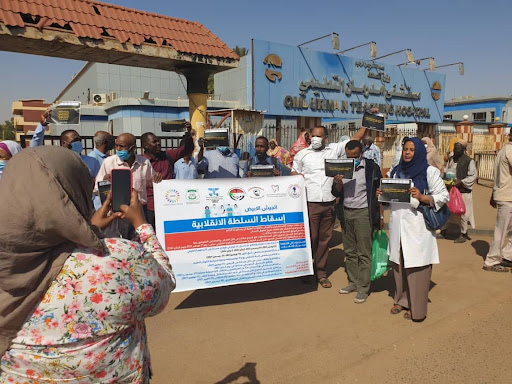
Increased attacks on health workers and facilities are worsening the humanitarian situation in Sudan amidst a crackdown on ongoing protests against military rule.
Protests broke out after a military junta —led by Abdel Fattah al-Burhan—ousted former Prime Minister Abdalla Hamdok in late Oct. 2021, and dissolved the Transitional Sovereignty Council, a power-sharing government between the civilian and military leaders, created in 2019.
Since October, pro-democracy activists have been calling for a transition to civilian rule despite the reinstatement of Hamdok who later resigned after increased pressure for joining the junta in government.
Earlier in Oct. 2021, Duha Moneim, a resident of Khartoum, Sudan’s capital, told HumAngle how security forces were using excessive violence against demonstrators. Since then, hundreds of protesters have been injured from live gunshot and tear gas canisters, with at least 63 people dead, according to the Central Committee of Sudanese Doctors (CCSD), a medical union associated with the protesters.
CCSD also accused security forces of attacking medical workers, besieging hospitals and intercepting ambulances during attempts to rescue injured persons.
There have been 15 reports of attacks on healthcare workers and health facilities since Nov. 2021, according to the World Health Organization (WHO) on Wednesday, Jan. 12.
According to Ahmed Al-Mandhari, WHO’s Regional Director for the Eastern Mediterranean, most of the attacks committed against healthcare workers were in the form of physical assault, obstruction, violent searches, and related psychological threats and intimidation with the bulk of direct assaults mainly on workers. This, al-Mandhari said, was an unusual pattern compared to other countries.
So far, 11 incidents had been confirmed in the capital, Khartoum, and other cities, al-Mandhari said. At least two of the confirmed incidents involved raids and incursions by military personnel on facilities.
Others included arrests of patients and workers, as well as injury, detention, and forced searches.
WHO believes the number of incidents is cause for “great concern,” especially as the country documented a relatively low number of incidents in previous years.
In 2020, the country recorded only one incident while in 2019, seven of such attacks were registered despite the widespread social and political unrest surrounding the overthrow of former ruler Omar al-Bashir.
In 2021, the country recorded 26 attacks, with four deaths and 38 injuries of healthcare workers and patients.
The latest incidents have resulted in the suspension of emergency services in some facilities with some patients and medical personnel fleeing without completing medical treatment.
There are fears that the restriction on access to healthcare may exacerbate the country’s under-resourced health system amidst health threats like the COVID-19 pandemic, and a devastating humanitarian crisis in Western Darfur where rebel groups are waging a war against state forces.
According to WHO, Sudan already has a critical shortage of healthcare workers, with only 23 qualified doctors per 10,000 members of the population. The figure puts the number of the country’s population with no access to healthcare at 14 per cent.
In its 2022 projection, the United States Agency for International Development (USAID) said an estimated 14.3 million people would require healthcare and other humanitarian needs in 2022.
Following the October coup, supplies of food and medicine have become more erratic as the international community stopped aid to Sudan to pressure the military government to hand over power to civil rule.
Violation of Geneva Law
HumAngle understands the targeted attacks on healthcare workers, patients, and facilities are a violation of international humanitarian laws, particularly the Geneva Convention.
Article 10 of the 1909 Geneva Convention provides that “the personnel engaged exclusively in the collection, transport and treatment of the wounded and sick, and in administration of medical formations and establishment shall be respected under all circumstances.” The section gives primacy to the respect of medical personnel to save lives and be protected above every other thing.
This, the WHO emphasised in its call for an immediate cessation of all activities that endanger the lives of health care workers and patients or impede delivery of essential health services.
“Health care workers who have taken a professional oath to save the lives of others must be allowed to work without fear or concern for their personal well-being or that of their patients,” said al-Mandhari.
The WHO regional head urged authorities to enforce implementation of Sudan’s Law on the Protection of Doctors, Medical Staff, and Health Establishments, approved in 2020, and to comply with international humanitarian law.
For him, the sanctity and safety of healthcare workers and facilities “must be respected and remain neutral, even within a highly politicized context.”
As a signatory to Geneva Law, Sudan is obliged to repress breaches of its provisions. While the military junta was yet to react to the situation, the Khartoum State security committee had expressed regrets at the “violations” of hospital grounds and pledged to provide high-ranking officers inside facilities to monitor any breaches.
Support Our Journalism
There are millions of ordinary people affected by conflict in Africa whose stories are missing in the mainstream media. HumAngle is determined to tell those challenging and under-reported stories, hoping that the people impacted by these conflicts will find the safety and security they deserve.
To ensure that we continue to provide public service coverage, we have a small favour to ask you. We want you to be part of our journalistic endeavour by contributing a token to us.
Your donation will further promote a robust, free, and independent media.
Donate HereStay Closer To The Stories That Matter




